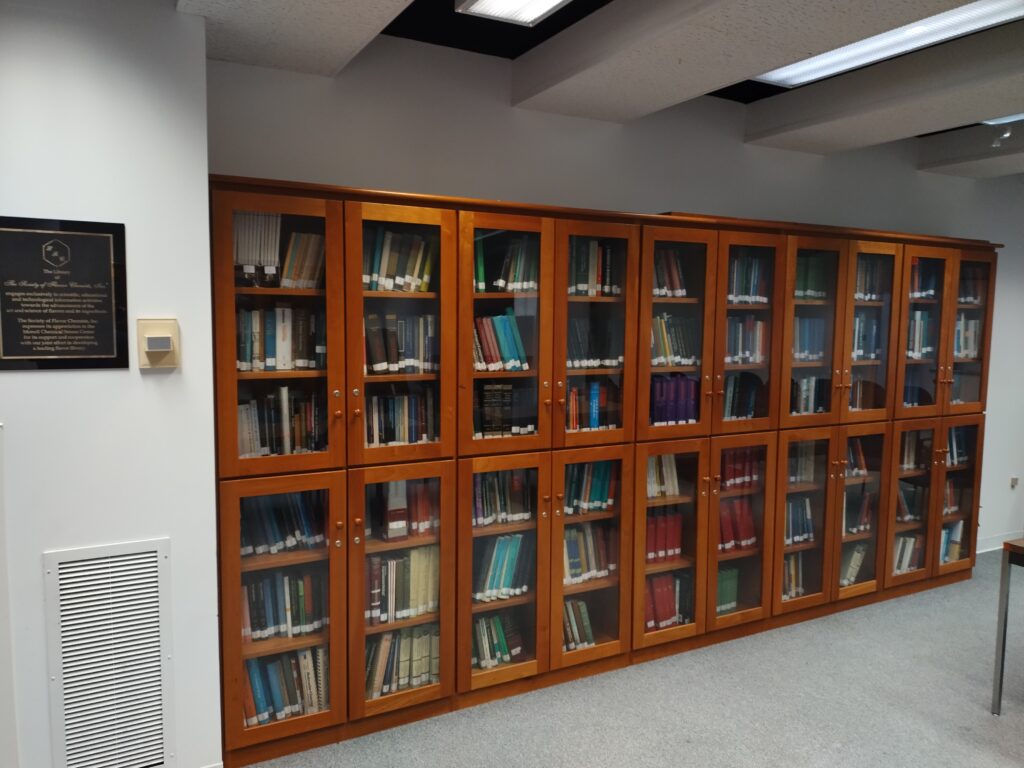TinyCat’s Library of the Month is all about the senses of taste and smell: introducing the Monell Chemical Senses Center Library! Associate Member and Chair of the Library Committee Danielle Reed, Ph.D., was kind enough to field my questions about the fascinating work their library assists with:
Who are you, and what is your mission—your “raison d’être”?
Our library supports a non-profit research institution called the Monell Chemical Senses Center. To unpack what our name means, Monell refers to the family that contributed to our institution’s founding and continues to support us through the Monell Foundation. The ‘chemical senses’ part of our name refers to taste and smell, which allow us to sense chemicals in our environment, on our tongue (taste) and noses (smell). We are a Center because we are the only institution in the world devoted solely to studying taste and smell. Our mission is basic research, which you can learn when you open a textbook, and clinical research, which has immediate practical benefits, such as testing a new way to treat smell loss. Our mission is important because while taste and smell do not get the same attention as vision and hearing, the loss of these senses with COVID-19 made many people more aware of their value. Many people regain these senses as they recover, but some people have not.
What relevant timing for your work. Can you tell us some other interesting things about how your library supports the community?
We are a ‘subject library’ meaning that we only have material relevant to taste and smell, and we have early “hard to find” journals like Chemical Senses and technical reports from industrial groups like the Sugar Foundation. We also have dissertations from people who were among the first scientists to work at Monell, as well as books and conference proceedings. We even have a small cache of children’s books focusing on taste and smell.
We are an appointment-only library, and while I care about books, I am not a trained librarian – but I know enough to help the scholars who want to come and work in our library and get professional help with cataloging. I am especially proud that I helped Nadia Berenstein (http://nadiaberenstein.com/about-me) find materials for her dissertation about flavor and flavor chemistry.
How very cool! Do you have any particular favorite items in your collection?
My favorite item in our collection is a book called Genetics of Perception and Communication, about why and how individuals differ in their taste and smell perception. Members of a species, from bacteria to humans, use chemicals to communicate, e.g., bacteria secrete chemicals called quorum-sensing molecules to let other bacteria know it is safe to expand and grow (or not), mice communicate their health and sexual status in their urine, and humans use chemicals in many ways to communicate, either consciously or unconsciously. This book has chapters written by scientists who are experts in their area, and it covers species from invertebrates, mice, rats, and humans. I love it because it is a rare book on an underappreciated topic.
Your library clearly hosts a rich array of resources around taste and smell. Is there a particular challenge that your library experiences?
One challenge for our library is to keep our mission focused on taste and smell and ensure that we have a comprehensive collection but don’t amass books that are not directly in our topic area. We get many book donations, especially from retiring scientists, and while many books are a fit for our subject site, many are tangential. Another challenge is figuring out what to do with these just-miss books and where to donate them so that they do the maximum good for scholars and others interested in them.
What’s your favorite thing about TinyCat, and what’s something you’d love to see implemented/developed?
Our favorite thing about TinyCat is that it does the job we need at a price point we can afford, and we would love to see it expand to do archive cataloging. We are preserving documents of enduring value, especially those from our creation and early history, and TinyCat does not have archive features, e.g., Omeka.
You can already catalog custom media using LibraryThing’s existing fields—putting the name of an item or artifact in the “Title” field, adding tags or reviews as needed, etc.—and you can organize them under the “Media” field. See our blog post on cataloging custom materials for more information on this process. That said, we can certainly discuss anything further that you’d like to see! I appreciate the feedback.
Want to learn more about the Monell Chemical Senses Center?
Visit their website at https://monell.org/, and explore their full TinyCat collection here.
To read up on TinyCat’s previous Libraries of the Month, visit the TinyCat Post archive here.
Want to be considered for TinyCat’s Library of the Month? Send us a Tweet @TinyCat_lib or email Kristi at kristi@librarything.com.
Labels: libraries, Library of the Month, TinyCat






0 Comments: